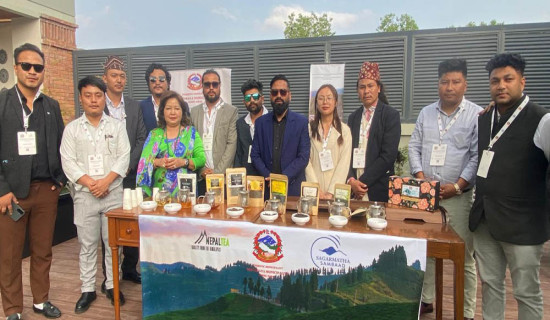- Sunday, 18 May 2025
SQC: Global Personality Development Initiative
Nepal's education system, though evolving, continues to face significant challenges in aligning with modern educational needs. The traditional focus remains on rote learning and bookish knowledge, with students confined within the four walls of the classroom. This approach often prioritises exam results over real-world skills and character development, leaving students ill-prepared for the complexities of the modern world. Character education, which fosters qualities like leadership, ethical decision-making, and social responsibility, is notably lacking. As a result, students may excel academically but struggle with critical thinking, creativity, and the interpersonal skills essential for success in today’s globalised world. This disconnect between academic learning and personal growth highlights the urgent need for educational reform in Nepal, where holistic approaches such as Students' Quality Circles (SQC) offer promising solutions.
SQC, initiated from Nepal in 1999, is a groundbreaking educational process and a movement designed to cultivate leadership, critical thinking, and problem-solving skills among students. Often referred to as the Father of SQC, Prof. Dinesh Prasad Chapagain envisioned and adapted the industrial Quality Circles model into the academic arena, offering a dynamic approach to education that empowers students to solve real-world challenges while focussing on personal growth and character development.
Quality circles into SQC
SQC represents the third generation of quality circles, evolving from the Quality Control Circles (QCC) originally practiced in Japanese industries. These circles enabled employees to collaborate in identifying and solving productivity and quality-related problems, thereby enhancing the overall performance of companies. Prof. Chapagain revolutionised this concept by integrating it into the educational sphere, where students use the same collaborative, problem-solving approach to tackle academic, social, and personal challenges.
The goal of SQC is not just to solve problems but to foster the development of well-rounded individuals, termed 'Total Quality Persons', who exhibit good character and 21st century skills. By working together to identify problems, analyse root causes, and implement solutions, students develop qualities such as responsibility, teamwork, and innovation—all essential for future success.
At its core, SQC is an educational process that engages students in active learning and leadership. In this process, students work in small teams to identify problems they encounter in their academic or personal lives. Using systematic and scientific approaches—tools like brainstorming, cause-and-effect analysis Pareto analysis, why-why analysis, and flowcharts help students identify their recurring problems, analyse the root causes of the problems, find out the countermeasures, and implement them to solve the problems.
This structured problem-solving framework gives students ownership of their learning environment and equips them with practical tools to overcome challenges. By placing a strong emphasis on personality development, SQC helps students build not only academic knowledge but also essential life skills like critical thinking, collaboration, and communication.
Global reach of SQC
In an increasingly competitive and complex world, academic knowledge alone is no longer enough. SQC goes beyond traditional education to develop essential 21st-century skills crucial for personal and professional success. Students engage in critical thinking to analyse problems and find data-driven solutions, while learning collaboration to work effectively in teams. Communication skills are honed through presenting ideas clearly, and leadership abilities are nurtured as students take initiative and guide peers towards shared objectives. SQC also cultivates creativity, encouraging innovative thinking to tackle unique challenges.
Beyond academic achievement, SQC aims to foster ethical, responsible, and proactive individuals who can positively impact their communities and the entire world.
What began in Nepal under the organisational flagship of QUEST—Nepal has expanded across borders, reaching countries such as Sri Lanka, Bangladesh, India, Pakistan, Mauritius, China, the USA, the UK, and Australia. Educational institutions in these countries have adopted the SQC model, recognising its value in shaping young minds for the future.
The international spread of SQC underscores its universal appeal. Whether in classrooms or communities, the principles of problem-solving, collaboration, and personal growth are universally applicable and crucial for shaping the leaders of tomorrow.
QUEST-Nepal
In 2006, Prof. Chapagain, together with like-minded educators and school leaders, founded Quality Circles in Education for Students’ Personality Development—Nepal (QUEST-Nepal). This organisation was created to institutionalise SQC in the schools of Nepal, with a mission to promote quality education through SQC practices. QUEST-Nepal's vision is to integrate SQC into the daily learning processes of students, helping them develop into 'Total Quality Persons' who are academically excellent, socially responsible, and equipped to lead in the advanced society.
Through its training programs, seminars, workshops, conventions, curriculum, and text books, QUEST-Nepal has helped schools implement SQC effectively. The organisation also provides a platform for students and educators to share best practices and experiences, ensuring that the SQC model is continuously evolving and improving.
Conclusion
SQC is more than just an educational initiative; it is a movement aimed at transforming students into complete human beings with good and smart characters. By applying the principles, processes, tools, and techniques, SQC equips students with the skills and character needed to excel in an increasingly complex world.
As the SQC model continues to spread globally, its impact will be felt for generations, producing students who are not only academically proficient but also responsible, ethical, and capable of leading positive change in their communities.
Through SQC, education evolves beyond textbooks, fostering a new generation of total-quality persons who are ready to embrace and shape the future.
(Adhikari is an education leader, trainer, and quality consultant.)










-original-thumb.jpg)






